Tuesday, April 14 2015
  
Readers often ask writers where do you get your ideas? Writers ask each other the same thing sometimes. The answer can be as simple as I went for a walk, or it could be far harder to explain. Ideas come from many places and are fed by brainstorming with yourself or others. For me, it's mostly about creating complex characters and then putting them in a difficult situation to see what they will do. For those who write thrillers or who-done-its the front page of the daily paper is teeming with possibilities. Seems like there are crazy things happening all around us every day. And I dare anyone with an imagination to visit a historical site of any type and not find lots of ideas lurking in the ancient walls and pathways.
My first book in print was a mainstream novel about three men in a tight race for the White House. I once flippantly replied to the query what made me write it that I didn’t like any of the choices I’d had for most of my adult life and decided to create my own candidates. In a way, that was partially true once I got to creating the characters, but mostly it was one man’s personal journey. My protagonist was in a close, three-way campaign for president when he was confronted with a personal crisis during the last critical weeks. I got my ideas from a number of places, some of them real life stories. Here, newspaper stories about different people experiencing different life events and how those impacted their public life provided leaping off places. My imagination did the rest.

I also enjoy historicals. Partly because I enjoy history and partly because I like to imagine living in a different era, a past very unlike where I exist. Ideas for stories seem to leap out at me when I visit old sites. One book, not yet in print but hopefully one of these days, starts out on an island off the coast of Maine. I sailed there with my daughter and my dad one glorious summer day. The island was once a busy community of farmers and fishermen, but today it’s deserted with just old cellar holes to mark where the houses once stood. I’d read some of the history of the island before I sailed out there and knew there had been a bustling trading center at the time of the Revolutionary War. So, as I stood on the edge of one of those empty fieldstone foundations gazing back towards the brilliant blue harbor, one of the stones beneath my feet wobbled. Then came the random thought: What if I fell into that old cellar, hit my head and was knocked unconscious? And what if when I woke up, there was a roof over my head? So that’s exactly what happened to my heroine. I had a grand time writing that story.
Old deserted buildings of all kinds provoke questions about who lived there once and what their lives might have been like. Castles and churches, old taverns and narrow twisting alleys lined with homes built hundreds of years ago. Maybe it’s just my busy imagination, or maybe it’s the ghosts of those people who once lived there urging me to tell their stories. A visit to the Boston Tea Party museum and a meeting with Samuel Adams, or a saunter around Mount Vernon and a chat with George Washington’s body servant make the men and women we met in the history books back when we were in school come alive. Suddenly their everyday lives inspire me with stories of others who might have lived back then, in those same places, experiencing those same events.
 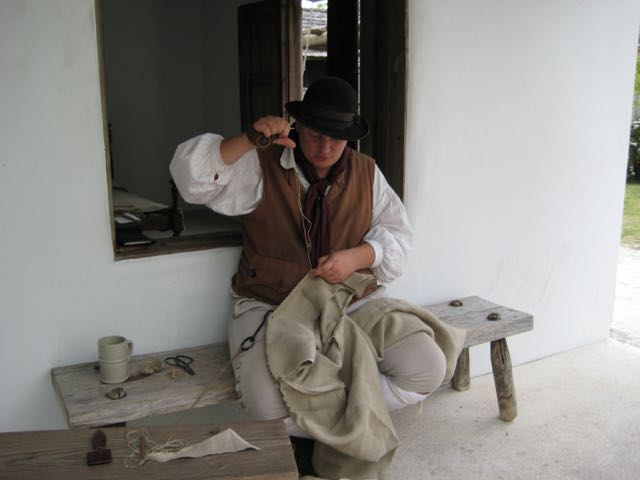 
I’m currently writing a contemporary romance series about a family living in a town I created on the coast of North Carolina. I can’t say for sure where Jake first came from, but he grew out of the aspects that I find intriguing about the heroes I’ve read and been touched by, both fictional and real. And the more I knew about him, the more I discovered about the kind of heroine he’d be likely to fall in love with. Then it was just a matter of putting them together with a mountain of conflict to overcome. So, I guess it all just boils down to asking yourself, "What if?" And letting your imagination take flight.

Tuesday, April 07 2015
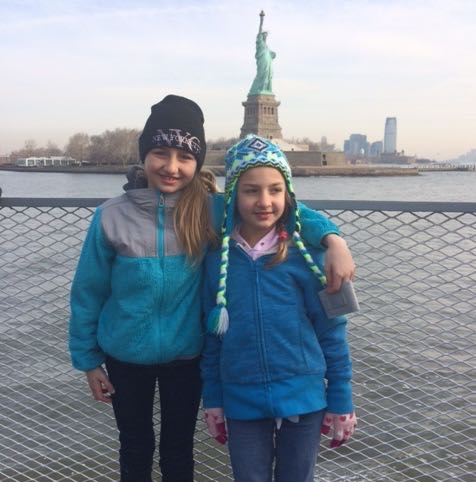 
My campaign to instill an interest in history in my grandchildren added a new chapter yesterday. Theresa, Lynn and I took a ferry out to visit Lady Liberty and Ellis Island. Before our trip Theresa (almost 10) read a novel about a boy who went on a field trip to Ellis Island and ended up meeting his own ancestor when he traveled back in time. Lynn (a first grader) devoured a book loaded with facts about the Ellis Island immigration center, and I found it amazing the amount of facts she soaked up and shared when we were there.
We would have liked to possess tickets to climb up inside the newly renovated Lady Liberty, but those were sold out until June. Perhaps I’ll have to come back and we can go again. Instead, we scooped up the recorded guides and setout to learn about this magnificent gift from the People of France that represents what America is all about for the millions of immigrants who gave up everything they once knew to come to America. Both girls were amazed to learn that in 1886 when Liberty Enlightening the World was first erected, she was the tallest thing in New York City. For kids born in an era of 100-story skyscrapers trying to wrap their minds around the fact that the tallest buildings in NYC were only five stories tall, but Lady Liberty was 22 stories tall was quite a stretch. How much more impressive this incredible statue must have been then! Theresa was pretty taken with the fact that even her fingernails are as long as an adult’s forearm.
Although I’d been out to visit this National Monument before, even I learned a few new things – most striking – around her feet are chains and a broken shackle that represent freedom and that her tablet is inscribed with the date of our own declaration of independence, July 4th 1776.
 The great Hall where immigrants were processed. The great Hall where immigrants were processed.
Then it was back to the ferry for Ellis Island where we took a ranger guided tour, and Lynn shared more of the interesting facts she remembered from her book. She told us that immigrants were asked if they had the $25 required (as proof of self-sustainability,) but some lied as they had no money at all. Medical exams were brief and if you had any number of ailments, they would write a letter on your jacket in chalk. Certain nationalities were required to turn their jackets inside out and women were lot allowed to immigrate unless they had a husband with them or waiting for them. But even more impressive than the little details were the bigger figures.
From 1892 when the federal government took over restricting who could and could not immigrate into America until 1954 when the facility on Ellis Island was closed, over 12 million people came to our shores via this entry point and on their busiest day, April 17th 1907, officials processed 11,747 individuals. It is said that over 40% of Americans today can trace at least one ancestor back to Ellis Island.
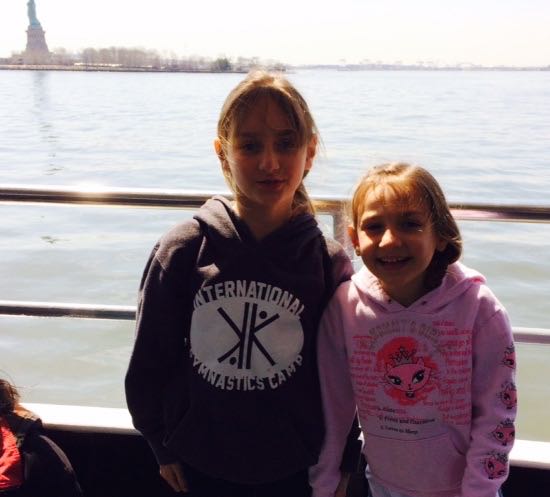 
Another ferry ride took us back to Manhattan. On landing we stopped to watch a talented group of brothers demonstrate some fantastic break dancing moves before heading north to visit the 9/11 World Trade Center memorial. For the girls, the square water pools that delineate where the buildings once stood were fun to check out, but having been born since that day, they are too young to feel the gut-deep horror of what that day must have been like for those who were there when the planes flew into the towers or the powerful emotions that fill the hearts of everyone else who remembers with sharp poignancy where they were and what they were doing with they first heard the news.
I’m not sure where our next history adventure will take us, but this bright spring day taught all three of us a few new things about what a blessing it is to be an American.
Tuesday, March 31 2015
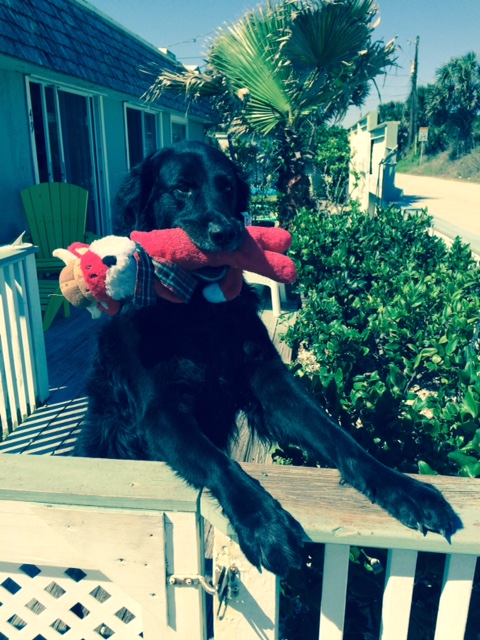 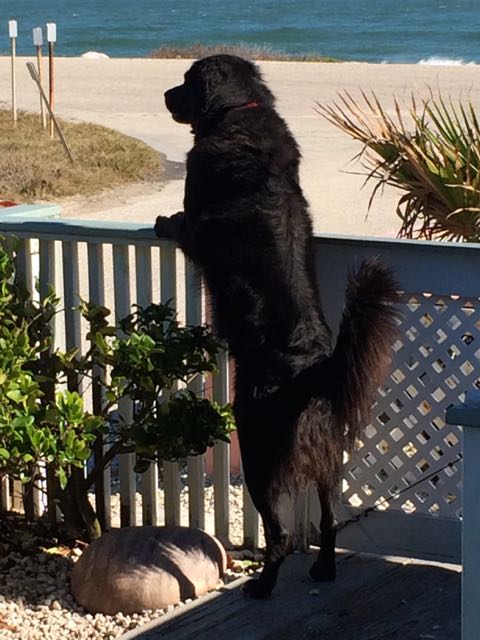
While I won’t deny that I really would enjoy having a significant other around who stands on two feet and doesn’t leave clouds of hair everywhere, I am fortunate to have Mr. Sociable sharing my life. He wears a fur coat year round, gives sloppy kisses and has put himself in charge of my at-home social life.
We live on a corner, and because the beach is just a few yards away, lots of folk pass by our deck
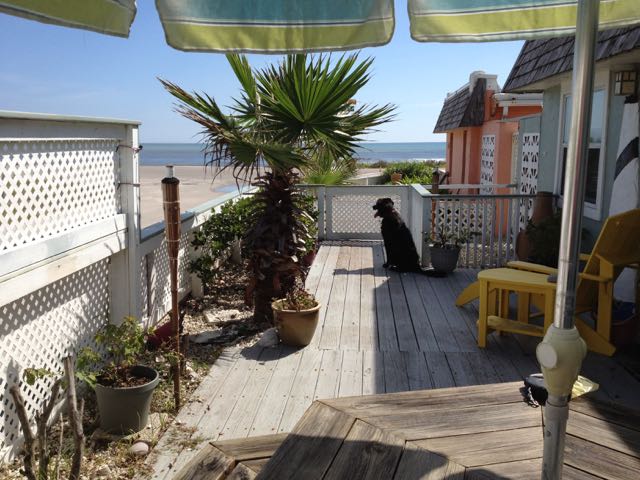 
on their way to the water. And MacDuff, who loves people and thoroughly enjoys saying hello to everyone is in his element. He barks to tell me when another dog is passing by and if there wasn’t a fence around the yard, he’d be right out there to greet them all with a thorough sniff and a wag or two. But when human friends happen by he immediately hunts for one of his toys, which he must have in his mouth before he can greet anyone of importance who stops to say hi.
At first this was just his thing. If he was inside, he'd sit looking out making urgent wuffing sounds to be let out. And if he was already out, he'd stand under the window in front of my desk muttering the same urgent summons to tell me he must come in to get a toy. So, I get up to let him in, he dashes to his toy basket, chooses the first one he sees and hustles back out to greet whatever friend is waiting for him. But somewhere along the line, just getting his toy wasn’t enough. He decided that I needed to be included in the social encounter so I wouldn’t miss all the fun. If I ever had an inclination to be a hermit, I’d have to rehome the mutt because he’s quite insistent that I talk to every friend we have, every time they show up. Which in a couple cases is more than once a day.
 
I have to admit, the interruptions are a good thing. At first, when he came in to repeatedly nudge my hand making it impossible to continue typing, I was reluctant to leave my story lest I lose my train of thought. But I’ve come to enjoy my several times daily visits over the fence, chatting about everything from the weather to grandkids to great books we are reading and any other topic of the day. Once MacDuff has ensured that I am out and engaged and he’s gotten his ears scratched, Mr. Sociable goes to lay down, satisfied that he’s done his job.
I live alone, but thanks to MacDuff, I am never really alone. Writing is a lonely pursuit, but MacDuff sees to it that I don’t take that too far. As I finished typing this blog post, I looked up and there he was, sitting under my window looking at me. There was no one outside to visit at the moment. He just wanted me to come out to toss his toy and play keep-away for a bit. He wouldn’t mind a few pats while I’m there either, and I get off my duff to enjoy a few moments in the fresh air and sunshine. What more could one want?
 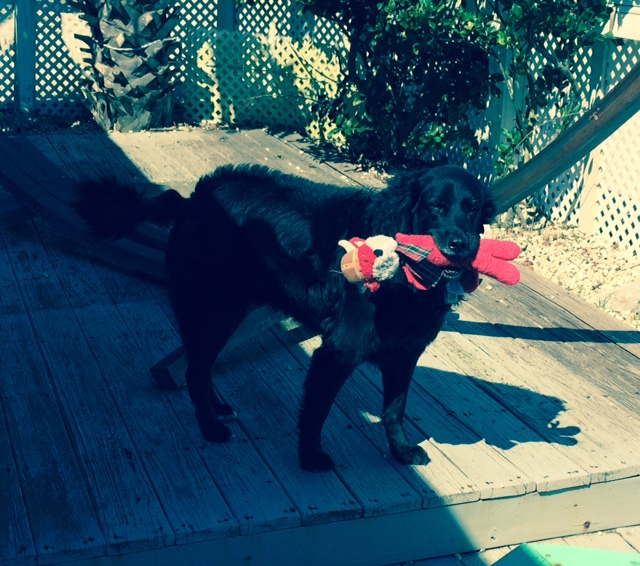
Saturday, March 21 2015

Research is a must for writers, even those writing fiction. Some of us don’t care for the necessity, but others enjoy the hunt for facts and new ideas. I’m in the latter camp, but I have to confess, sometimes I get totally distracted from the work in progress when what started out to be tracking down a small detail or fact turns into a fascinating discovery of whole new worlds, thoughts, bits of history I didn’t know and more.
I am a writer of fiction so my research isn’t the sort of exhaustive hunt for every fact connected with whatever subject the non-fiction work is on. But all my protagonists have backstories, careers, hobbies and lifestyles and if I stuck only with write-what-you-know, my characters would very quickly bore my readers to death even considering that I’ve been told by many that I’ve led an interesting life.
As a writer in the twenty-first century, I appreciate the internet tremendously. You can find out the most arcane details in a matter of seconds that would once have taken hours and days if not months to track down before Google became not just a search engine, but a verb. In one book I was writing, my heroine’s favorite baseball player was Carl Yastrzemski who played for the Boston Red Sox. As I was writing one scene, I suddenly needed to know if he’d been playing that fall and if it had been a home game on that particular day. In less than a minute, I not only knew it was a home game, but that he’d been benched on that day. How long might that detail have taken before the internet? I could, of course, have skipped that line or paragraph, but other times one cannot. If, for instance your coroner is doing an autopsy and you need to know about a specific detail that is crucial to the mystery. Or a Police procedure. Or are helmets required on motorcycles in a given state? How long does it take to get a marriage license in another state, or country, or century?

Wikipedia is a fountain of information and a great place to start. It's also a total distraction considering how many clickable links you find in an entry. You could get sidetracked for an entire day clicking from one fascinating connection to another. Once upon a time I used to do the same thing in an encyclopedia, but it’s even easier now. Depending on just how much depth and accuracy you need, be sure to follow up with other sources after reading what Wikipedia has to offer. Google can take you to many official sites, too. I recently visited the official site of the Marine Corps at Camp Lejeune NC to find out how far the hospital was from the commissary and found maps, bus routes, and a dozen more related sites. It was like touring the base. Want to find out the main sport and mascot for a college or university or the names of the dorms? Visit the college or university site. Every entity has them now and they are wonderful sources of information. Medical sites with lists of symptoms and treatments, state sites with info on law enforcement and government, federal sites with everything about everything at the Federal level that's not security related. You can find out just about anything on the internet.
And then there are books. I love researching in books. I have whole shelves of books I’ve found or purchased on my own library shelves, but there are libraries everywhere and they all have wonderful selections to get lost in. Some of the libraries I’ve studied in include the New York Public Library, the Boston Public Library and the Bowdoin College library in Brunswick Maine. Just standing among thousands of books holding gazillions of wonderful facts and stories is exhilarating. And did you know many libraries have research materials available online. Like the library in Edinburg Scotland. While it would be great fun to actually go to Edinburg or other far away places, that isn’t always possible.
 
And don’t forget personal interviews and tours. Take a tour of the Budweiser plant or a chocolate factory. Do a ride-along with the local police department, visit the fire station or join the behind the scenes tours at museums. If you’re writing a historical and it’s feasible to travel to the location, visit all the historic sites attached to your era and pick the brains of the docents you meet. They know tons of stuff that isn’t always shown and they love to share their passion. Actually being IN the place you are writing about is more than just raw information, it's also ambiance. Standing by the bank of a massive swift flowing river would give the writer of a historical novel a gut level feeling of what it would have been like to cross that river before the bridges we see today were built. Looking up into the shadowed and echoing high vaulted ceilings of a hundreds-of-years-old cathedral imbues feelings you won't find in the church on the corner of Main and Elm streets in anywhere USA, just as visiting a farmers market is very different from your local grocery store. Sitting in a police cruiser, listening to the dispatcher and watching the police in action on their every day rounds will give you a better idea of what that life is like. Spending a few hours in the harried surroundings of an emergency room, or attending a baseball game at the home field, or a rodeo, or listening to children playing on the beach all have such powerful settings from the sounds to the smells, from the excitement or contemplative to downright frightening. And all those are things you simply cannot read about - you just have to be there and feel them, see them and experience them.
I've also found that most folk are happy to share their personal vocations, so don’t be shy about asking individuals for either in-person interviews or via email. Whatever your characters are doing, real people are doing in every day life so check it out and experience or see it first hand. Research can be an adventure well worth taking even if 99% of the information you glean never makes it into your book. Just knowing the facts will make your fiction come across more real and draw the readers into your world.
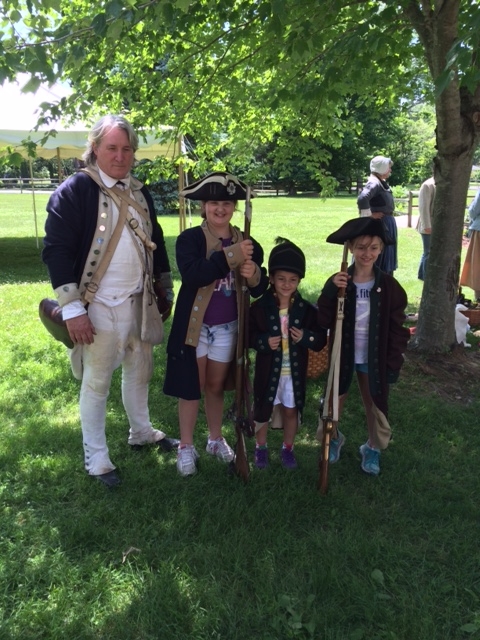  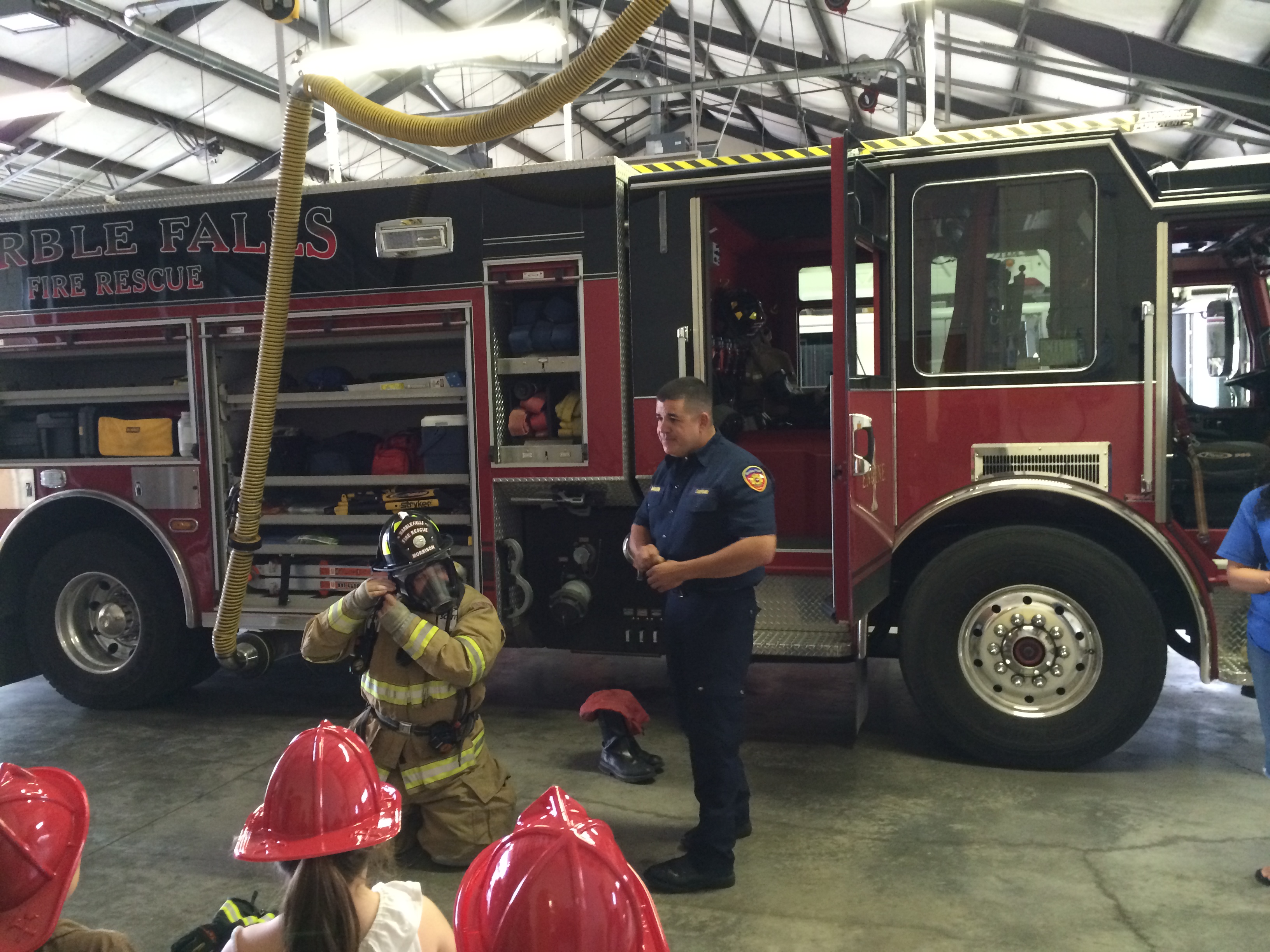
Occasionally, I read a book where it’s obvious the author did not do their homework before writing. If the details that are off are just a few, I can easily skip over them and forgive the inaccuracy. Goodness knows, even when you’ve done thorough research for your book, there are times when you just plain miss something or, because of the plot, you have to fudge the facts a bit. But if a book is glaringly unresearched I lose interest quickly. Either I am irritated by the constant mistakes, or I find the characters shallow and can’t relate to them. I don’t think I’m alone here either so my advice to any author would be: take your research seriously. And enjoy the ride while you’re there.

Here are a few other writers who have shared their thoughts on the subject of research. Check them out:
Tuesday, March 17 2015

Usually we equate procrastination to negative habits. We have a big project or even just a long list of little ones that we keep putting off. I like many others respond well to having a deadline because suddenly there is no time left for all the lures that draw our attention away from these jobs that must be done. We have to knuckle down and get to work. And when the last chore on the honey-do list is checked off we feel a lovely sense of satisfaction. Or when that big project is complete and we can show it off, there’s a great deal of pride in the accomplishment. So what was all the delay about in getting busy in the first place when we knew how pleased we’d be once we had gotten the job done?
I’m retired from the nine to five life, but since the day I left that world I’ve become a published author and now a whole new world of tasks sits on my desk waiting for me to get down to business. I have a series going, two books out, one coming out soon and three more in the works. I’ve also been invited to submit short stories to anthologies, visit blogs and I need to keep my own blog going. So there is always a writing project or several waiting for me to sit my butt in the chair and get busy. And just because I’m retired from a life governed by a clock and someone else’s agenda, doesn’t exempt me from housework, yard work and maintenance. If I kept my nose to the proverbial grindstone, my house would be immaculate, the paint would be fresh, the car would be washed and vacuumed and there would never be a dirty dish in the sink. I’d be cranking out books and stories and always seeking new and better ways to promote them. Yet, I procrastinate.
I got a Fitbit to start this new year off and so far, I’ve met my daily step goal every day but one. I’ve even increased that step goal on the first day of each month, so there is always that “Gotta get the steps in” lurking in my thoughts. I keep important appointments and places I need to be on my phone, which provides me with musical reminders, but I also own a slim calendar notebook where I can jot down things I want to get done for the year, the month and the day. And I use a highlighter to indicate when they have been accomplished. Being a listmaker, this is a satisfying way of keeping myself motivated and having a visual sense of progress. And still, I procrastinate.
But perhaps there is another side to procrastination, that just maybe offers rewards we would otherwise miss. Some of the most rewarding moments in my life can’t be added to a Honey-do list, logged on my phone or jotted down on that column of tasks on my calendar.

Consider this day: I’d met my step goal, there were no dishes in my sink, the dog had been walked, the laundry folded, my bills paid, my email checked and Facebook visited, yet each time I brought up my current manuscript and glanced at the notes I’d left for myself where I’d left off last time I worked on it, I started looking around for another task, procrastinating yet again on the work in progress. I reread the notes, stared at the screen . . . and then decided to go to the grocery store to get all three things on my current list of stuff that needed to be picked up next time I was out. I was on the way home when a flash of color caught my eye. It was late in the day and the sun was setting. I pulled off into a small park that overlooks the inland waterway and got out of the car to see the most fantastic display of color, perfectly mirrored in the stillness of the river. The magnificence of it took my breath away. Had I not been procrastinating, I’d have missed it entirely.
  
Sometimes the distraction is a passerby. I live on a corner and my dog doesn’t have the nickname “Mr. Sociable” for nothing. He not only wants to say hello to anyone going by, especially people we know, but he wants me to leave my desk and come out to say hi as well. He dashes into the house and nudges my typing hand until I get up and go out with him. And those moments that I spend talking with neighbors and strangers have been moments well worth the distraction from the business at hand. It’s not just about taking the time to smell the roses – it’s reaching out to touch other people, to connect, sometimes to listen and be a shoulder to lean on, sometimes to share a moment of laughter or appreciation. Sometimes it’s solace or a hug when I need it most.
So, I guess I have to say, Thank You God for procrastination. Thank you for distracting me long enough to appreciate the beautiful world you have created, and thank you for letting me ignore the “must do” list long enough to appreciate moments of laughter, tears and joy with the people you have sent into my life.

Tuesday, March 10 2015

I'm always hoping the answer to this question is an argument in favor of the state of my desk most of the time.
Like many writers, I think I want to write in a nice tidy environment, and I make sporadic efforts to clean my desk off and put stuff away. It always looks so nice I feel like taking a photo to remind myself what it looks like. But it doesn’t take long for the bits and pieces to add up. A fellow writer recently posted a photo of her desk immediately post writing “The End” in her current novel and I had to chuckle because that’s exactly what my desk looks like at the moment.
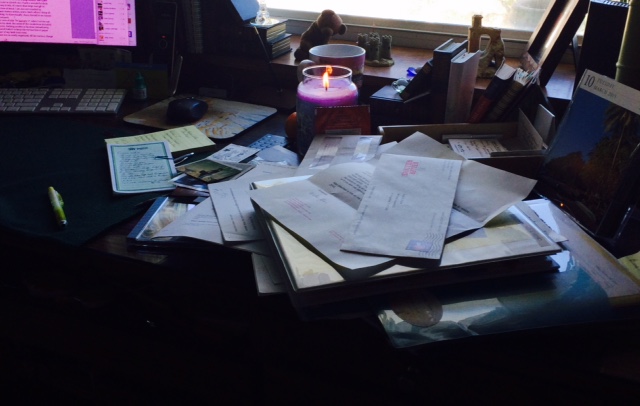
Unlike many writers, I don’t have a desk that consists of a long counter like space with shelves overhead and plenty of room to stretch out. I have a wonderful desk my brother built for me and when I keep it tidy, it’s more than large enough to handle all the things that need to be close at hand. I am also surrounded by bookshelves on three sides - the closest shelves within arm’s reach where I keep all the books frequently used while writing. So theoretically, there should be no reason why I can’t write in tidy surroundings.
Unfortunately there is my Must-take-care-of pile. On Jaunary 1st, when I wrote out my New Year’s resolutions, I cleaned my desk. But some of the resolutions included dealing with a few non-writing projects. Nothing needed to be done immediately, but they did need to be done. So I found folders to keep the various bits of paper organized and set them on the corner of my desk.You know - that pile of things you are afraid to put out of sight where you’ll forget them, yet don’t want to do right now? The pile that eventually threatens to take over your desk and your life?
As the first two months of the year passed, I took care of a couple items in those tidy little files. Then other things got added, but didn't get so neatly organized. All the various charge slips that I keep long enough to compare to my bills got sandwiched into the pile in numerous places. My dad and I still exchange snail mail letters and his latest one was on the pile waiting to be answered. A tea bag sample pulled off a catalog, a stack of old photos I’d found and thought might be fun on Throw Back Thursdays for FB, reminders, appointment cards, business cards I needed to file, the questionnaire for the lawyer to redo my will and trust paperwork, TurboTax waiting for the last tax documents to arrive (If I put it away, I might forget I’ve purchased it and go out for a second copy.) a new CD that I haven’t loaded onto my computer yet, a charity I meant to write a check for and half a dozen recipes that FB friends posted that I simply have to try. Now the pile is so untidy and large it spills into my workspace.
And I haven’t even written the end. In fact I’m a long way from the end. I can’t put it off any longer. Like all the rest of my housekeeping, my desk finally gets cleaned off when I can no longer ignore it.
And that’s why this blog post is up later than usual today. (I even took a detour long enough to deal with one of my must-do items.) So, back to what my desk is a sign of. I'm hoping this tidier and better organized desktop is the sign of a productive writer with a story worth the telling in my mind.

Tuesday, March 03 2015
Today I am delighted to feature Slightly Noble, a historical romance set near the end of the Civil War, but in England rather than in America. Don't you just love stories with a twist? He might be a viscount, but he'd far rather just be Captain Jack, privateer and outlaw. That is, until he meets Abby Halsey.
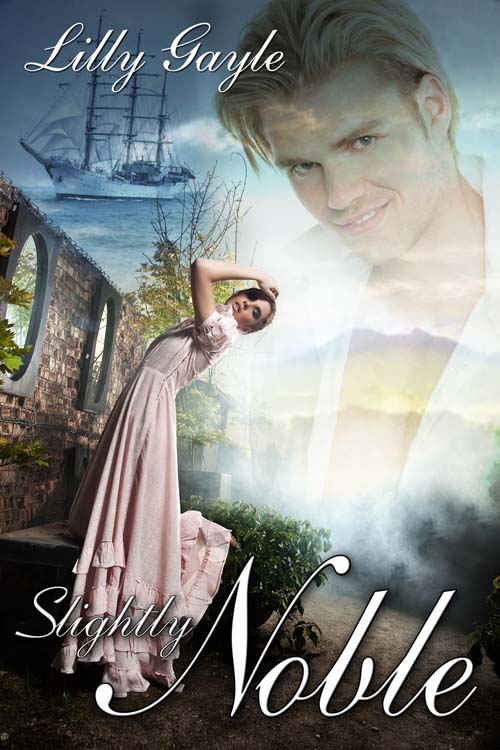
"What’s a girl to do when all her plans to marry well go awry and the charmer she thought cared for her only cared about taking his pleasure, then leaves her pregnant and without any prospects? Abby Halsey’s father’s solution was the send her to a convent until the baby is delivered and adopted, but a young nun suggests that she knows how Abby could claim widowhood and keep her baby. Eager to take this chance, Abby flees from the convent, but again fate seems certain to interfere when Abby goes into labor early. She might still have made it work, except that her coach broke down and her rescuer, for reasons of his own decides the best course of action is for him to marry her.
Captain Jack, ashore to hear the reading of his estranged father’s will finds himself disinherited completely unless he marries and produces an heir before his 35th birthday. But his birthday is only a few months away, so all seems lost. Then he stumbles across the unlucky Abby.
Slightly Noble is full of twists and turns, scheming relatives and trouble in places least expected. Captain Jack, now a viscount, can’t go back to America where he’d been a privateer on the side of the south and is now considered an outlaw and traitor. But how is he going to convince the world that his marriage is for keeps and the child is his? How is he going to convince his new wife that he’s not like the cad who had his way with her and abandoned her?" Skye-writer
Here's a teaser:
She raised her chin. “I am a commoner, but as you have guessed, my father was accepted in certain social circles. Accepted, but not always welcomed.
“Well, you will be welcomed now, Abby. You are a viscountess.” His voice softened, but his eyes shone with disappointment. Was it because he had hoped she would confide in him? Or because she had confessed her humble origins?
Pride stiffened her spine. “I am more than just a viscountess. I am a wife and mother, and if I am to be a good wife, at some point, I must act like a wife.” This meant running a household, not living on a ship. She did not want to argue or have him ask more questions about her past, but she could not bear living aboard a ship indefinitely.
He started, his expression surprised. Then a slow smile spread over his face, and his eyes burned as if he had a fever. He leaned over the table, his face mere inches from hers. “A real wife sleeps in her husband’s bed.”
Abby’s breath hitched. Her pulse jumped. Oh dear! He had taken her meaning all wrong. Heat rushed to her cheeks, and her flesh tingles. “What I meant…That is, I should be running your household.”
“We live on a ship,” He leaned back in his chair. He still smiled, but it was now more humorous than…armorous?
She shivered, unable to suppress a brief surge of longing. What would it be like to kiss that hard mouth? To feel his lips pressed against hers?
Dear Lord! What is wrong with me?
Check it out at your favorite place to purchase books.
Slightly Noble:
American privateer, Captain Jack isn't really an American, but heir to a viscountcy. When his father dies, he leaves everything not entailed with the estate to his worthless cousin. Jack's only hope of inheriting his mother's ancestral home and honoring her dying wish is to marry and produce an heir before his thirty-fifth birthday—in five months. And he doesn't have a single prospect.
Pregnant and unwed, Abigail Halsey is sent by her father to an Anglican convent until he can find a family to adopt his grandchild or a husband for his daughter. Abby has other plans, but they go awry when she goes into labor early and her rescuer, a pirate captain turned lord, insists on marrying her.
Is Jack too much like his jealous, unforgiving father? Can Abby overcome her fear of men and have a real marriage? Or will she never be anything more than the unwanted wife of a Slightly Noble Viscount?
Available at: Amazon, Barnes & Noble and Wild Rose Press
About the author: 
Lilly Gayle is a wife, mother of two grown daughters, a new grandmother, and a breast cancer survivor. She lives in North Carolina with her husband. When not working as an x-ray technologist and mammographer, Ms Gayle writes paranormal and historical romances. You can visit her at: http://lillygayle.com, or find her on Facebook at: http://facebook.com/lillygaylebooks and on Twitter at: http://twitter.com/lillygromwriter
Monday, February 16 2015

Another writer and I were talking about point of view recently. We were discussing the prevailing wisdom in the writing world that the point of view you want to be in for any given scene is that of the person with the most to lose, or gain. We also discussed well-known best-selling authors who break all the point-of-view rules and head-hop so much that even their biggest fans get dizzy, but that’s a subject for another day. The latest weather report for the northeast gives me an excellent example to explain how very different the same event can be experienced depending on whose point of view you see it from.
Huge white flakes are dancing past the window when you wake up and you can’t even see to the end of your own driveway. The car is snowed in again and it doesn’t look like the street had been plowed either. There are already several inches of the new stuff on the ground and the weatherman eagerly displays a map showing this storm is far from over. Is another day of snow a good thing? Or a bad thing? Is there excitement? Fear? Worry? Or just grin and bear it?
You’re a kid with a brand new sled and it's a school day - another ten inches of snow is most definitely a good thing. A GREAT thing. But if you’re the kid’s dad and you have to shovel the driveway before you can get out for work, or you take public transportation and you end up standing in the wind and blowing snow for a half hour because the bus is late your view is decidedly less positive. And what if you’re the family dachshund desperate to find a place to do your business and get back to the warmth of the house? Or the mom who has to take yet another day off of work because there’s no school. Again!
 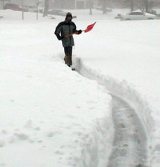 
The same event. The fourth Monday in a row with a foot or more of snow. So many points of view to see it from.
The Fisherman who knows his boat will sink if he can’t find a way to get to the dock and clear the snow off it.
The guy in the plow who’s already been up all night clearing streets.
The owner of a building who knows that the weight of the snow already on the roof is more than the roof is rated for and here comes more.
The policeman, or nurse, or doctor who can’t take the day off, but the roads aren’t plowed yet. They’re going to have to pray they can get to work safely.
  
And that’s just a snowy day in New England in 2015. Think about the books you write or read.
What if someone has a gun? How many different points of view? The man with the gun? Or the person the gun is pointed at? The father or mother or lover of the person the gun is pointed at? Maybe it’s a cop trying to make a split-second decision – shoot or not? Or maybe the man holding the gun is trying to work up the courage to end his own life. There could be half a dozen people in the scene with the gun, but who has the most to lose? Whose point of view adds the most tension and emotion to the scene?
Point of view is important. If you want excitement, then maybe the snow should be seen from the eyes of that kid with the sled or a brand new BB gun. If you want a sense of urgency, then maybe it’s the doctor with a very sick patient waiting for him to get to the hospital or a robber hoping the bank teller will hurry up. A feeling of impending disaster? Try the fisherman with his life savings tied up in a boat about to sink under the weight of the snow or a a handfull of soldiers outnumbered ten to one. Point of view does more than tell a story. It sets the tone and lets the reader know what’s important. Point of View makes all the difference in how emotionally invested the reader will be in the story.
Tuesday, February 10 2015
There are a lot of great workshops for writers, and I’ve picked up a ton of super tips to take home and incorporate into my writing style. Some have been story-savers, some have made me think, some have pushed me in a whole new direction. Almost all have managed to light at least a flicker of excitement that sends me back to my desk eager to get back to my work in progress. In the last two weeks, it’s turned out that both of my regular writer’s meetings have featured presentations on plotting and outlining, and in spite of not being a plotter, even these workshops sparked something for me to take home. Is someone trying to tell me something?
I admit, I’m a list-maker. Doesn’t matter if I’m considering New Year’s resolutions, going to the grocery store or out on errands, lining up my personal Honey-Do list or getting ready to close up the house before I head to New England for the summer, there is always a list. A handwritten list. Usually on a clipboard on my counter. I get a great deal of satisfaction out of crossing things off and seeing progress. If I complete a task that was not on the list, I add it and cross it off, too. Hey, I did it, I deserve the credit!!
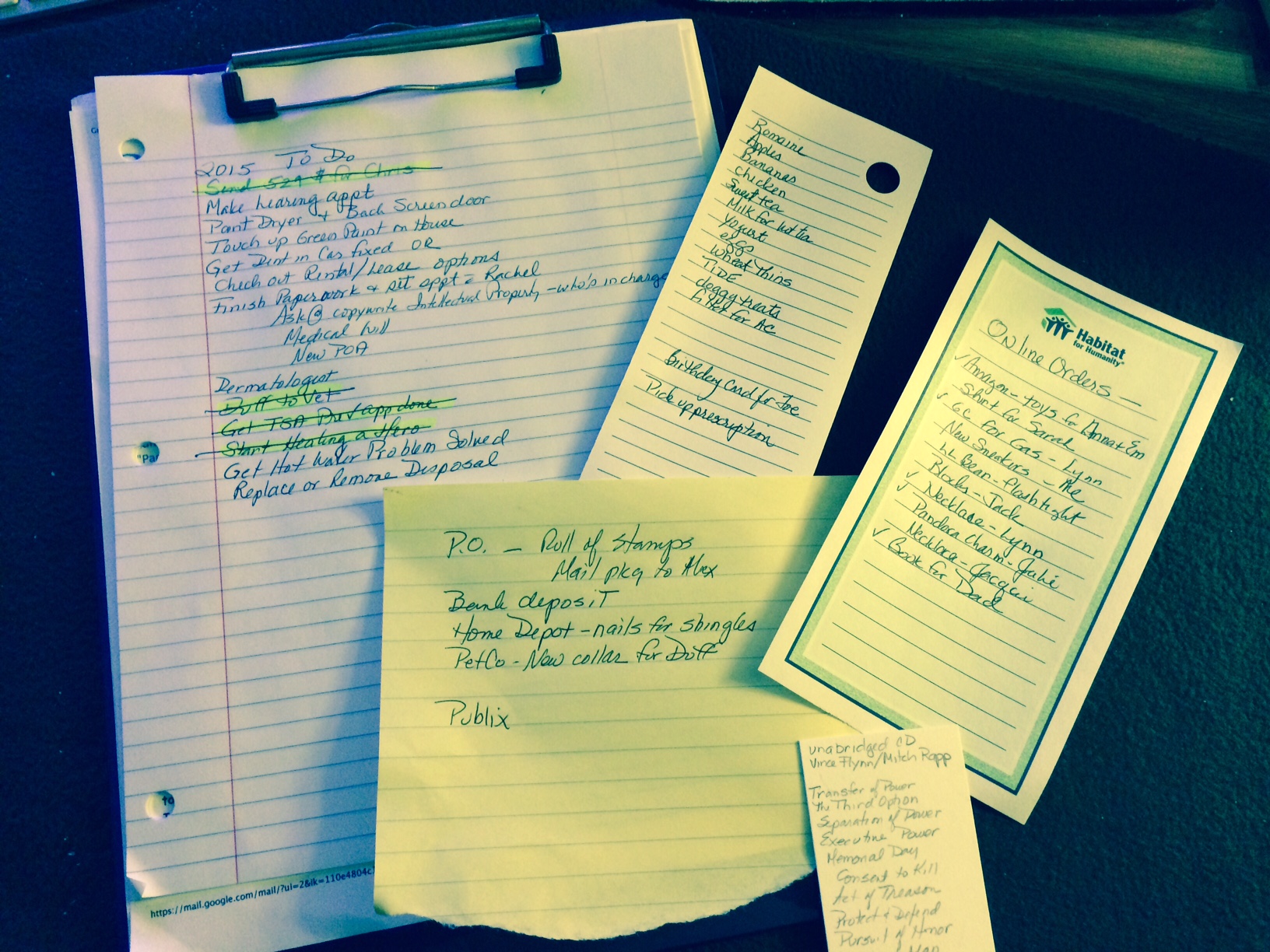
But when it comes to writing, I’ve been more of a Pantser than a plotter. I do know where and how my story will end when I start and often even write that grand finale scene before the book is even partially written. I also have a detailed backstory for my main characters, which is written - typed that is, and printed out for the working notebook. If there is a family involved, I often draw up the family tree and fill in things like spouses and kids and grandparents. But no outline.
 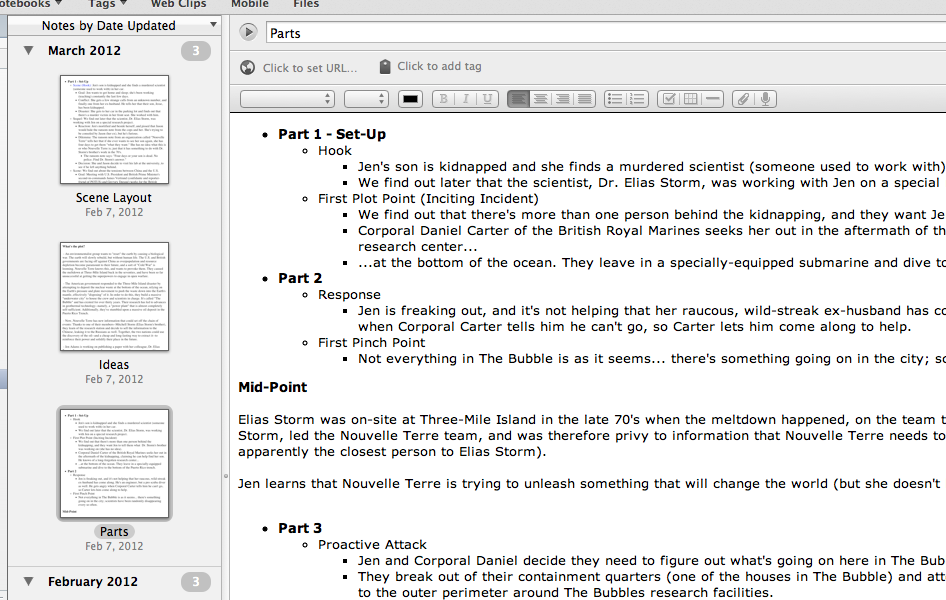
So, I come home from these back-to-back workshops on outlining and plotting and I’m wondering if I should give it a try. If I’m good with lists – why not a list of chapters or scenes? So I spent the week between workshop 1 and 2 with the KISS outline plan offered up by a man whose books I love reading and who seems to have a good grasp on the value of outlining. What I came up with seemed easy and straightforward, but didn’t really do much more than put the storyline previously rattling lose in my head on paper. Workshop 2 done by another great author I admire included a story-board which seemed like another great idea. I got myself a display board at Michael’s and dug out my multi-colored Post-its. For three days I jotted ideas, plot points, required events, scenes, random thoughts and other bits and pieces on Post-its. Then I carefully arranged all the sticky bits on the board where it seemed most appropriate for them to go. NOW, I’m ready to write.
Or am I? What I didn’t take into consideration was the layout of my workspace. A big story-board, either a cardboard display or a blank wall might work great in big homes with spacious offices. But I just didn’t know where to put it in my cozy office in my beach bungalow. But then I recalled yet another super author who explained how she had a notebook with a page for each chapter onto which she put Post-its with various notes and reminders for her stories. I’d tried it, but had abandoned it because being a “pantser” I tend to end a chapter when a really good hook comes along and I never know when that might be ahead of time. But what if I combined these ideas?
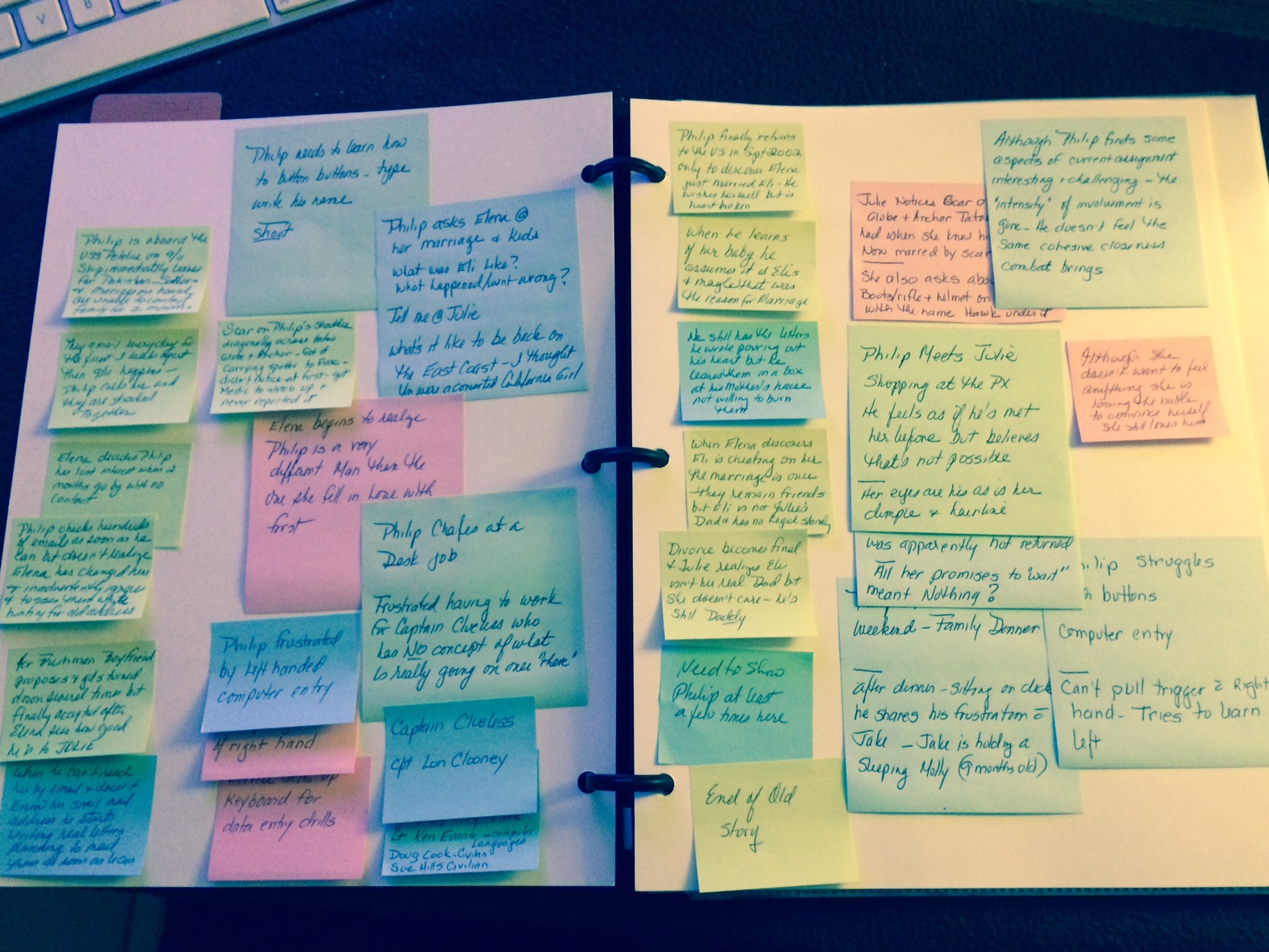
I am excited with the result and eager to see how it goes as the book unfolds. I used card-stock, punched holes and put them in a slim binder then transferred all the neat little Post-it notes, plot points and events, dark moments, first kiss, resolution and finale. It just might be working because in the first two days after it was assembled, I got over 4000 words written. I did have to take yesterday off to create a 15-year timeline. Since my WIP is book #4 in a series, I discovered I needed to have a visual (another list!) of all the recurring characters, when they graduated, got married, had kids, moved, where they moved to so I wouldn’t end up having them married in one book, then only engaged in the next, or something worse. So, NOW I’m on a roll. With a List and an Outline.
I’ll let you know how it goes.

Tuesday, January 27 2015
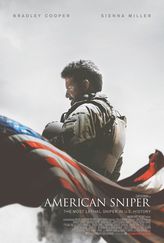 
Last week I took myself to see American Sniper. I don’t go to the theater very often, but I am glad I made the time. It touched me as few movies do and taught me more than I expected. I wasn’t alone in the impact it had on me either. As the credits began to roll, when the theater lights come up and everyone begins to move toward the exits with animated chatter about either the movie they just enjoyed or their next activity, this day was different. Everyone remained seated for a few minutes, as if uncertain what to do next. And even as we began to make our way out, there was not a single voice heard in the entire place. Just the quiet shuffle of feet on the carpeted ramp. The shocked silence of people who had been moved by emotions that weren’t to be blithely put into words.
As an author who has already written one story about the effects war has on the individual warrior and her family and is now at the start of another, I had come, in part to experience on the big screen some of the turmoil and heartbreak that I’d read about when I was researching for my books. If you have never been to war, or loved a warrior you can’t really know what it feels like just as you can’t possibly know what it’s like to lose a child unless you have lost your child. But this film, so brilliantly directed by Clint Eastwood and superbly acted by Bradley Cooper and Sienna Miller, does bring a great deal of those emotions to life for those of us who can never know the whole.
For anyone who may not know, Chris Kyle’s story is not fiction. There have been some angry sniping with words about Kyle, name calling that simply doesn’t belong any more than the soldiers returning from Vietnam deserved to get scorned and spit upon. They were all warriors, doing the job they were sent there to do. If detractors have a problem with the war, or what the war has done to the Iraqi and Afghani people, then they need to address those concerns to congress because that’s where the decisions to go to war come from. Not from the warrior sent to carry out the orders. Some critics have questioned whether the movie was as apolitical as its director claims. Others seem to think that more should have been said about the plight of the thousand of soldiers who have come home broken in body and spirit and the horrendous rate of suicide among those young vets. But the bottom line was this was a story about one man and what war meant to him personally and to his wife and children.
 
No one can ever really know fully every thought or feeling that Chris Kyle had, but this movie shows clearly the conflict that can rage in a warrior’s heart and soul as he strives to carry out his orders. With his crosshairs on a child carrying a hand grenade and running toward the very soldiers Kyle was sent to protect, his soul was torn. Pulling the trigger went against every instinct and belief he had grown up with, yet to not pull it meant certain death for those soldiers. How can anyone who has not been there, who has not had to make that horrendous decision, set themselves up as judge? And because Kyle was good at what he did and clearly saved hundreds of his fellow warriors’ lives, when he finally left the service after four tours, he was torn again, by the feeling that in getting out he was betraying men who might die because he would not be there to watch their back. Those conflicts were very real and very well shown.
Then there was the toll his service to his country and his fellow warriors had on his family. This, too, was very well portrayed and deserves your consideration. If you feel compelled, as some very loud and strident voices have already, to argue that this was a distortion of who Kyle was as a man, you are free to your opinion, but try instead to translate the essence of the lesson to the bigger picture. Try, if you can, to see the total sacrifice we ask of our warriors and their families when we as a country choose to go to war. That sacrifice is very real for the hundreds of thousands of American men and women who have served in this longest war in our history, and to their families who have to cope with so much heartbreak and angst that the rest of us will never truly know. And whatever else Kyle may or may not have been and done in his life, he died trying to help other troubled veterans who were struggling to come to terms with the cost of war on their souls.
Some of the detractors of this movie have suggested that those who went to see it were angry people. I’m not sure why they think this is so. I wasn’t angry and I don’t think those sharing the theater with me that day were either. The silence following the last scene did not echo anger in any way, but rather a stunned and profound new understanding of the cost of war. This was not a movie about war. It was a movie about the hearts and souls of the warriors themselves. RIP Chris Kyle and God bless Taya and their children. Thank you to all who have put on the uniform and served and to their families who have sacrificed too much.
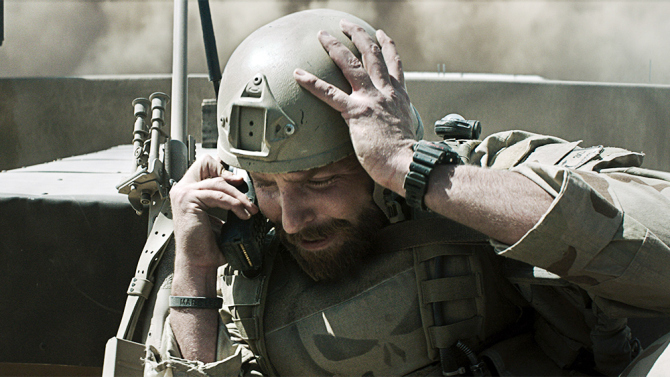
|